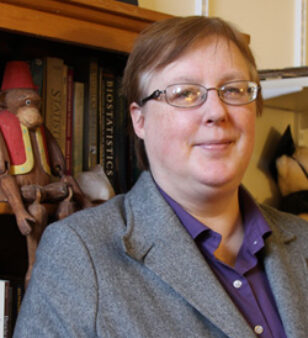
Education
B.A., Washington College
Ph.D, City University of New York
Career Highlights
Prior to coming to Cedar Crest College, Dr. Himmanen taught as an adjunct instructor of Psychology at Hunter College and Lehman College in New York, and spent two years as a substitute assistant professor at Queens College in New York. For nearly twenty years she worked on a series of NIH and NSF funded projects with Dr. Karyl Swartz. These projects were among the first to use video monitors fitted with touch-sensitive screens to study cognitive processes in non-human primates, and included investigations in list learning and concept learning in rhesus and stumptail monkeys and the use of strategies for list learning in rhesus monkeys and orangutans.
During this time, Dr. Himmanen studied face perception and memory for conspecific faces as well as mirror behavior by rhesus monkeys. Dr. Himmanen has also conducted research with human participants providing data on familiarity, visual complexity, name agreement and imaginability for items on the Boston Naming Task, a diagnostic tool often used to the assessment of individuals with impairments caused by cerebral pathology.
Courses Taught
Dr. Himmanen teaches Experimental Methods, Statistics, Learning, Motivation and Emotion, Introduction to Biological Psychology, and Comparative Animal Behavior, and supervises student research projects.
Research Interests
Her research interests include face perception and recognition in human participants.
Why Choose Cedar Crest?
“I attended a small, liberal arts college much like Cedar Crest College as an undergraduate. It was there, with the help of my professors, that I discovered a passion for the scientific study of behavior. When it came time to move to a full-time teaching career, I thought of my professors and what an enormous impact they had on my life, and wanted to do the same for a new generation of students. Cedar Crest College was exactly what I was looking for, a small, liberal arts college.”
Advice
Critical thinking skills are the most important thing you will learn in your college career. A liberal arts education is not solely about facts and figures, it is about using facts and figures to learn how to think and solve problems.
How Did You Become a Teacher?
“Teaching is part of every graduate student’s training. The first course I taught by myself was a statistics course over the summer that I ended up with at the last minute. I was a nervous wreck about it, but my mentor assured me I would be great at it. Also, while I was preparing the course, I thought back to my undergraduate professors, and used them as models for how to teach. I quickly got over my concerns about public speaking and teaching, and the course was the first of many wonderful experiences teaching undergraduates. The decision to become a college professor was actually a graduate one for me–I saw a future for myself in the research field. But as I taught more and more, I realized I enjoyed it just as much as research.”